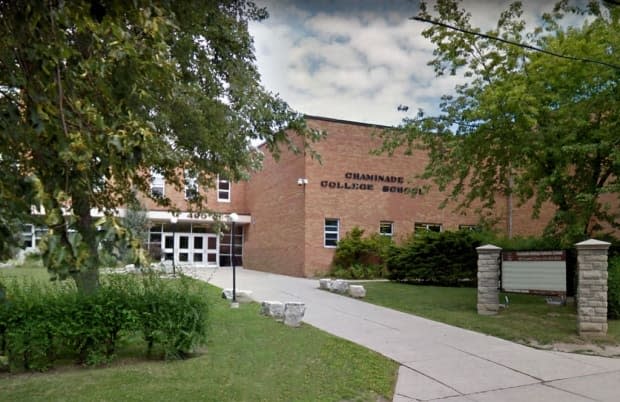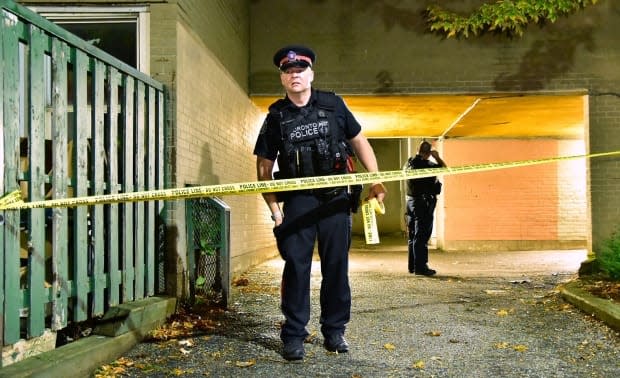Family of 15-year-old demands answers after TCDSB makes him attend in-person classes
UPDATE: Since CBC first started investigating this story, the TCDSB has offered Nekeba Cuff a full online learning option.
The family of a 15-year-old boy who lives in one of the neighbourhoods hardest hit by COVID-19 is pushing the Toronto Catholic District School Board to let him learn full-time from home — despite the board's policy that students who have been suspended must attend in-person classes.
Nekeba Cuff, a Grade 10 student, was suspended in October for stabbing another student.
When a TCDSB student is suspended or expelled, he or she is invited to attend the Transitional Intervention Program for Suspended Students (TIPSS), while waiting for an expulsion hearing.
Where a student attends TIPSS is based on where they live. Cuff had been traveling by bus from his home near Jane Street and Finch Avenue West to classes at the Toronto Public Library branch in The Junction near Jane Street and Dundas Street West.
Cuff's mother, Kisher Thomas, says she feels the TCDSB is forcing her to choose between her son's health and his education.
"With COVID going around I'm concerned about his safety. Imagine going out, something happens, and God forbid, you get infected. What are you going to tell me? 'Oh, we're sorry?'"
Family wants same choice other students were given
The Ministry of Education requires all school boards to provide the option of full-time online classes this school year.
"School boards must work collaboratively with parents to ensure that all students have access to remote learning," the ministry said in a statement.
Cuff's relatives say that option wasn't immediately available to him.
The TCDSB says although it is committed to ensuring all expelled students have the opportunity to continue their education, some classes may be in person.

"Under the Education Act PPM 142 - School Board Programs for Expelled Students, the program includes an assessment of the attitudes and behaviour of the student as well as observing and assessing their interaction with other students and staff, all of which requires in-person attendance," the TCDSB told CBC News in a written statement.
The TCDSB has since confirmed it will accommodate families who request a fully remote option during the pandemic, including those of students in suspension or expulsion programs, to "ensure the safety and well-being of a child."
Thomas says she requested full online learning for Cuff in November, ahead of his expulsion hearing.
Paul Raso, executive director of the non-profit organization Education Involved Advocacy Group, helped the family through the process.
Raso, who is also a former vice principal for the TCDSB and worked in the Jane and Finch area for nearly 20 years, says the family was told by a TCDSB Superintendent that there was no virtual option.
Raso says a lawyer working for the board emailed the family an alternative, which stated "there is likely a solution that would accommodate a learning model where the student attended 3 days in-person and 2 days virtually with 80% attendance in both."
Thomas worries about the risk of Cuff getting the novel coronavirus on public transit or in a taxi. Having recently lost a grandmother to COVID-19, it's a big issue for the family and other people in their community.
COVID-19 affects Black people and other people of colour disproportionately in Toronto, according to data gathered by the city. The figures show that's particularly true for those living in low-income areas. ICES, a non-profit research institute, reported the COVID positivity rate in the Jane and Finch area is more than 15 per cent, the seventh highest in the province.
TCDSB must take boy's trauma into account, mentor says
After years in behavioural classes and special education, Nekeba ended up in the program following two suspensions. One incident was from a high school in North York where he threatened a teacher, and the second landed him a limited expulsion from Chaminade College School for stabbing a student in the leg in October.
The most recent incident is still before the courts.

Thomas says her son was remorseful but must take responsibility for his decisions.
"Right after that altercation, he took the shirt off his back to help the other student he hurt and wrapped it around his leg."
Raso's been trying to help Cuff since he was in Grade 6 and has vouched for him to the board.
"I've watched this kid grow up. He's smart, he's funny and he's great in school when he can get support, but we need to provide more options for students dealing with serious trauma," he said.
Trauma has followed the teen throughout his life, Raso says.
Two weeks before the suspensions, Nekeba and his mother saw the immediate aftermath of a double homicide right outside their door.
Nekeba looked out their window and saw two men on the ground bleeding. His mother actually placed the 911 call.
Thomas says living through traumatic experiences like that shooting in October of last year, and the deaths of close friends, has severely affected her son's mental health and social abilities.
Raso says no one from the school or the board ever called to check up on the teen after the shooting. And, he says, the board fails to factor in the trauma, or the dangers kids like Nekeba face when they're moved from one school to another.
"To send a kid from Jane and Finch who fears for his life because of the things he's experienced to a school just north of Regent Park, in another gang's territory, could be a matter of life and death even as a bystander," he said.
Raso says that's the reason he left the TCDSB — he "couldn't take going to anymore students' funerals."

When CBC News asked the Ministry of Education what it's doing to ensure the safety of students in communities such as Jane and Finch, the ministry responded that it's provided millions of dollars in additional funding to the area that could be used to hire more staff, students supports and pay for more technology.
Next steps
Raso and the family got an appeal hearing with the TCDSB on Dec. 2
The TCDSB says school administrators and staff want to work with families to develop an appropriate student action plan and also to address any concerns they may have, but the family says they don't feel the board has done that.
Thomas says they were contacted on Friday by the board with an offer for full time online learning but no formal intake meeting has taken place to discuss that option yet.
She says she is taking the weekend to think about the meeting but questions the board's ability to help her son because she doesn't trust them.
Thomas says her family will continue discussions for Cuff's education and perhaps help other students in the same situation.
In the meantime, they have pulled Cuff from the TIPSS program and are seeking other options.
They are now planning to file a human rights complaint against the TCDSB.
"Ultimately, we want to see kids in this board treated with dignity and respect in this program," Raso said.
For more stories about the experiences of Black Canadians — from anti-Black racism to success stories within the Black community — check out Being Black in Canada, a CBC project Black Canadians can be proud of. You can read more stories here.


